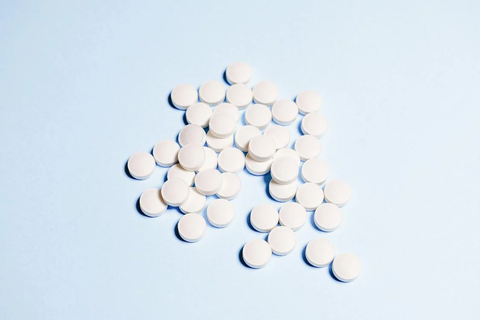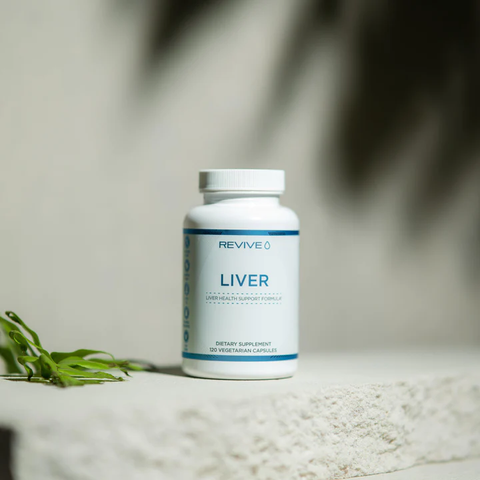Is Aspirin Bad for Your Liver? The Truth
When you have body aches from working out or a headache from stress, what medication do you usually turn to? Aspirin, of course! Aspirin is a widely used medicine that has been around for over a hundred years. Surprisingly, there hasn't been much solid research on how it affects the liver, though.
Most studies on whether or not aspirin causes liver damage were done back in the 1970s. Back then, some experts said that aspirin could, in fact, harm the liver. What’s puzzling is, that more recent studies, since the 2000s, suggest that aspirin might actually protect the liver.
We’re going to be answering the question, “Is aspirin bad for your liver?” below, so stick around!

How Aspirin Affects Liver Health
Before the 1970s, we didn't have the technology to easily and cheaply measure liver enzymes or do sonography. These tools help us detect liver problems early. The increase in liver patients today might partly be because we're better at finding liver issues now. Some major advancements in liver health include the hepatitis B vaccine, a cure for hepatitis C, better MRI imaging, and improved sonography.
In the 1970s, two things happened: people used aspirin for inflammation, and we got better at detecting liver issues. Interest in aspirin's effect on the liver dropped in the 1980s as newer, safer anti-inflammatory drugs came out. Still, it's not clear if these drugs actually help more patients.
At low doses, aspirin seems to be good for the liver. That said, older studies show that high doses of aspirin can harm the liver. It seems that aspirin has different effects on the liver depending on how much is in the bloodstream. There might be a certain point where it goes from being helpful to harmful.
Since aspirin is still used in medium doses for pain, we need to figure out at what point it becomes harmful to the liver. Let’s take a closer look at the ways in which taking aspirin daily could potentially affect liver health below:
Drug-induced liver damage
Your liver helps process the food you eat, the liquids you drink, and the medicines you take. If your liver doesn't work well, it can lead to some very serious health problems. One main concern that doctors have about people taking too many painkillers (like aspirin and acetaminophen) is that these types of medications, in high doses can cause drug-induced liver damage.
There are many reasons why drug-induced liver damage might happen. Some drugs can directly harm the liver, especially if taken in large amounts or for a long time. It probably goes without saying that people who already have liver problems are more likely to get liver damage from taking these medications.
Even though aspirin is frequently used to ease pain and lower fevers, researchers have looked into whether it might hurt the liver. In the past, studies suggested that too much aspirin, especially as a treatment for swelling, could damage the liver.
As mentioned before, though, recent studies show that aspirin might not be all that bad for the liver after all. While high doses of aspirin can be harmful, low doses might actually help protect the liver.
Complications from drug-induced liver damage
The liver is responsible for filtering out harmful substances in your body (called toxins). These toxins are either removed when you go to the bathroom or transformed into something safer for your body. If the liver isn't working properly because of damage caused by taking too much medication, these toxins can build up in the body over time.
The liver also helps process everything you eat and drink into energy and nutrients for your body. If your liver isn’t working properly, you might feel more tired or have trouble maintaining a healthy weight. The liver also helps with blood clotting, but if this important organ is damaged, you might experience issues with bleeding.
Low-dose aspirin could reduce the risk of liver cancer
We know that taking too much aspirin at once (or simply taking aspirin too often) isn’t great for your liver health. What about when you take low doses of aspirin in moderation, though? New research has revealed a possible link between taking small doses of aspirin and lowering the chance of getting the most common type of liver cancer, hepatocellular carcinoma.
The study looked at data from more than 50,000 patients and found hopeful results for people who were at a higher risk of getting liver cancer. Specifically, those who regularly took small amounts of aspirin saw significant decreases in both getting cancer and dying from liver-related health problems.
What's interesting is that the longer someone took low-dose aspirin, the better the benefits seemed to be, suggesting that the positive effects add up over time.
While these results are encouraging, more research is needed to fully understand how aspirin helps protect against liver cancer. It's also important to consider the pros and cons of long-term aspirin use. It may not be safe or effective for everyone — especially those who already have health issues.

Which Drug is Most Likely to Cause Drug-Induced Liver Damage?
This may surprise you, but the answer is not aspirin. It’s acetaminophen. Since aspirin and acetaminophen are used to treat similar issues (specifically muscle pain), it makes sense that there’s a lot of confusion about whether aspirin is bad for the liver or not.
Here’s the answer: too much aspirin is bad for the liver, but in low doses, it can actually be beneficial. Acetaminophen, however, is the leading cause of drug-induced liver damage.
Acetaminophen, which is commonly found in over-the-counter pain relievers such as Tylenol and Excedrin, is mainly used to ease pain and discomfort. It's also an ingredient in several creams and ointments that are used for muscle pain relief. However, as previously mentioned, taking too much acetaminophen is the main reason for sudden liver failure in many cases.
There are several factors that can increase the risk of liver injury from taking acetaminophen. These factors include drinking alcohol, having certain genetic characteristics, and using other medications at the same time.
Damage to the liver from acetaminophen usually starts to appear between 24 and 72 hours after taking it. Symptoms often become noticeable two to four days after the first dose.
It's very important not to take multiple over-the-counter or prescription drugs containing acetaminophen without consulting your doctor first. Mixing medications can greatly raise the risk of liver damage, so please seek medical advice before doing so. Your liver will certainly thank you for it!
How Do You Know Whether Your Liver is Damaged From Taking Too Much Aspirin or Acetaminophen?
If you’re worried that your liver has been damaged by taking too much aspirin or acetaminophen, you should talk to your doctor as soon as you can. The first thing your doctor will do is ask about your symptoms and health history.
They'll also do a physical exam and ask about any medicines or liver supplements you're currently using. They might also request a blood test, and if your test shows higher levels of certain liver enzymes, it could mean that your liver has, in fact, sustained drug-induced damage.

Diagnosing severe liver damage from medication requires ruling out other possible reasons for liver problems first — you shouldn’t necessarily blame it on regular doses of aspirin or acetaminophen right away. After all, the liver is a relatively delicate organ, and plenty of things (like drinking too much alcohol, for example) can lead to liver damage.
Your doctor will consider many things when making a diagnosis, such as when you started taking the medicine, how your liver reacts when you stop using it, if starting the medicine again affects your liver, the specific way your liver has been damaged, other things that could be harming your liver, and if other people have had liver damage from the medicine you’re taking.
Conclusion
Aspirin, famous for its benefits in reducing the risk of cardiovascular disease, has a complex relationship with liver health. While it can modulate the inflammatory response, offering protection against heart attacks and strokes, the impact of aspirin on liver cells and liver health requires careful consideration.
Studies have explored the dual nature of aspirin's effects, noting that, on one hand, its anti-inflammatory properties can be beneficial, but excessive or prolonged use may pose risks to liver cells.
The benefits of aspirin in potentially reducing liver cancer development and lowering mortality rates from liver disease have been researched. Some findings suggest that aspirin's anti-inflammatory and anticancer properties could mean lower rates of liver cancer in individuals at risk.
However, the relationship between aspirin use and liver health is not exactly straightforward. While low-dose aspirin may offer protective benefits against certain types of liver disease, there is a concern that high doses or long-term use could lead to liver damage.
Frequently Asked Questions
Does long-term aspirin usage damage the liver?
Using aspirin for an extended period of time, especially in high amounts, might lead to liver damage. While it's generally safe to use aspirin briefly and at low doses, using it excessively and for a long time could raise your risk of liver problems.
It's always a good idea to talk to your doctor about any long-term medication use, including aspirin so that you can keep an eye out for any potential liver-related health issues.
What are the side effects of aspirin on liver health?
Aspirin can affect the liver in a lot of different ways, especially if you take it in large doses or for a long time. These side effects might include liver injury, higher levels of liver enzymes, and, in severe cases, sudden liver failure (though, this is quite rare).
To minimize your chances of sustaining liver damage, you’ll want to make sure to stick to the recommended dosage when taking aspirin or any other painkiller.
Is it safe to take aspirin daily?
For some people, taking aspirin daily might be safe under a doctor's guidance, especially because aspirin has been known to reduce the risk of heart attacks and strokes. However, a daily dose of aspirin for a long time could cause bad side effects, like stomach bleeding and possible liver damage. Before you start taking aspirin daily, make sure to consult with your doctor so that you can weigh the benefits with the risks.
How much aspirin is harmful to the liver?
As you can probably imagine, the amount of aspirin that could damage the liver greatly depends on factors like how your body handles it and your liver's current condition. While small doses of aspirin are usually safe for most people, using too much could end up causing liver damage. Again, we can’t stress enough how important it is to stick to the recommended dose and seek medical advice if you're concerned about your liver health.
Are there alternatives to aspirin that are safer for the liver?
Yes, there are alternative medications you can take that might be safer for the liver. Nonsteroidal anti-inflammatory drugs (NSAIDs) such as ibuprofen and naproxen are commonly used pain relievers that might carry a lower risk of liver damage in comparison to aspirin, especially if used responsibly and as directed.
The information being presented in this blog is intended to be used as educational or resource information only. It is not intended to be a substitute for medical advice from your healthcare provider. This content should not be used for the diagnosis or treatment of any medical condition. If you have any questions or concerns about your health, please contact your healthcare provider. You should call 911 for all medical emergencies. Revive MD is not liable for any advice or information provided on this blog, which advice or information is provided on an “as-is” basis, and assumes no liability for diagnosis, treatment, decisions, or actions made in reliance upon any advice or information contained on this blog. No warranties, express or implied, are made on the information that is provided.
The information being presented in this blog is intended to be used as educational or resource information only. It is not intended to be a substitute for medical advice from your healthcare provider. This content should not be used for the diagnosis or treatment of any medical condition. If you have any questions or concerns about your health, please contact your healthcare provider. You should call 911 for all medical emergencies. Revive MD is not liable for any advice or information provided on this blog, which advice or information is provided on an “as-is” basis, and assumes no liability for diagnosis, treatment, decisions, or actions made in reliance upon any advice or information contained on this blog. No warranties, express or implied, are made on the information that is provided.


